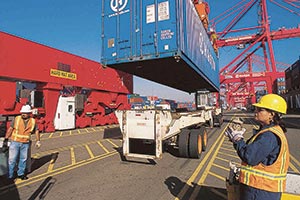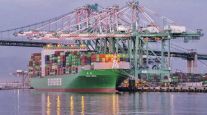ILWU Ratifies Five-Year Contract, Ending Dispute at West Coast Ports

This story appears in the June 1 print edition of Transport Topics.
West Coast longshore workers voted overwhelmingly to ratify a five-year labor contract with port terminal operators, formally ending the labor dispute that caused a logjam that disrupted trucking and intermodal operations for months.
International Longshore and Warehouse Union members voted 82% in favor of approving the contract with the Pacific Maritime Association on May 22.
The agreement, which covers about 20,000 workers at 29 West Coast ports, is retroactive to July 1, 2014, and runs through July 1, 2019.
Congestion caused by work slowdowns and uncertainty regarding the labor pact affected trucking operations regionally and across supply chains nationwide, and caused some shippers to divert cargo to other ports from late last year through early February, when the parties agreed to a tentative contract.
“The negotiations for this contract were some of the longest and most difficult in our recent history,” ILWU International President Robert McEllrath said May 22. “Membership unity and hard work by the negotiating committee made this fair outcome possible.”
The union’s approval was the final step because the PMA approved the contract days earlier.
“This contract provides an important framework for the hard work ahead to overcome new competitive challenges,” said PMA President Jim McKenna.
Ports along the West Coast limped along during the labor dispute, causing trucking to stagger as well.
“The consensus is the backlog has been dealt with in the short term,” said Alex Cherin, executive director of the California Trucking Association’s intermodal conference.
“What will be interesting is the potential long-term ripple effects that are not sorted out yet,” he said. “Retailers are still feeling the effects . . . and some of the temporary diversion [of moving freight to other ports] is still a factor.”
While the National Retail Federation said it welcomed the agreement, it issued a strong broadside noting its frustration with the extended impasse.
“Shippers can rest a bit easier knowing that the West Coast ports will be more stable over the next few years,” said Jonathan Gold, NRF’s vice president for supply chain and customs policy, but he cautioned that the industry needs to become more efficient.
“Stakeholders cannot afford to go through this process every couple of years,” Gold said. “We need a new system in place that benefits all parties and provides for the efficient transportation of the nation’s cargo and commerce.”
One issue that popped up after the contract was approved was ILWU’s authority to inspect and maintain truck chassis at ports.
The contract included a provision that the ILWU would petition the Federal Maritime Commission to rule on the legality of the union’s authority to inspect and maintain chassis “and perform roadability inspections, as they have on and off for years,” said Curtis Whalen, executive director of American Trucking Associations’ Intermodal Motor Carriers Conference.
“I’m not sure what FMC would do with it, but for [the union] to unilaterally start this . . . is less than helpful, as the West Coast is trying to get through the congestion problems that they’ve experienced for many months,” Whalen added.
An FMC spokeswoman said May 28 that, as of that date, the ILWU had not filed a petition.
With union inspections “often finding something wrong [real or imagined], that can lead to a waste of an hour or two of a driver’s hours-of-service allotment,” Whalen said.
There is a chassis-supply issue, he said, but the question to keep in mind is: Are the chassis that are available roadable-safe, as the law requires, especially in light of the pressure that congestion problems have had on the drayage system?
Cherin said May 27: “Yesterday was literally Day One under the new agreement, and it’s too early to tell what impact the maintenance and repair provisions are going to be.”




